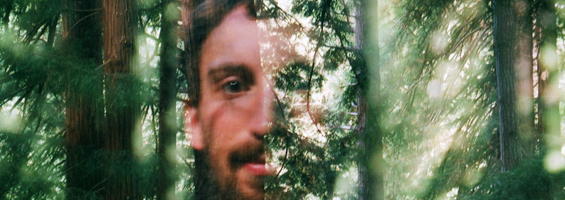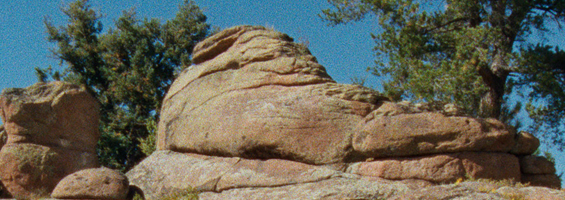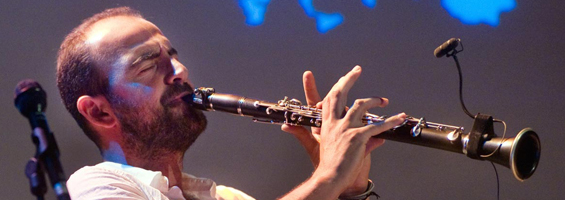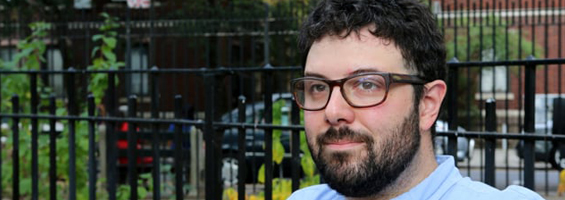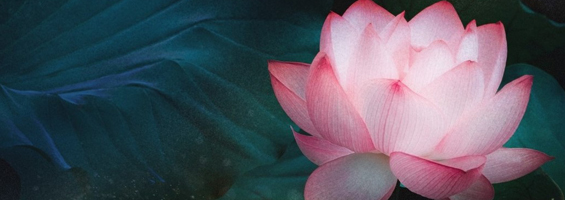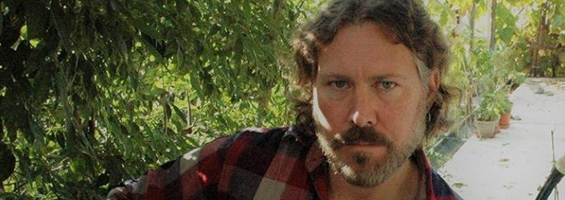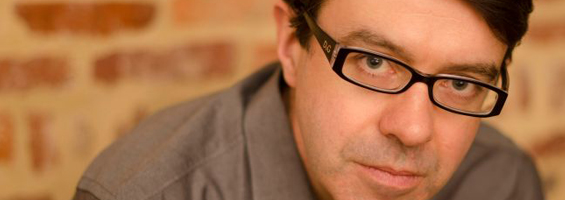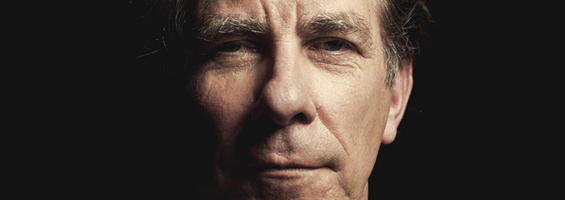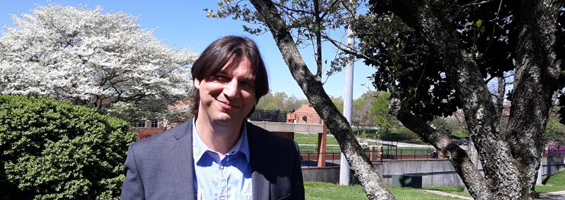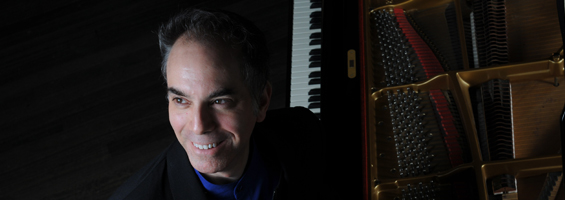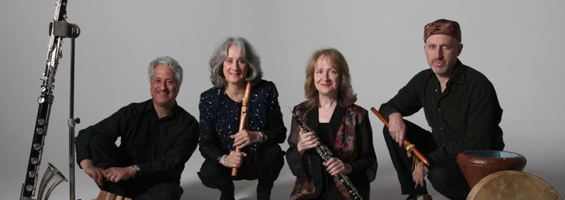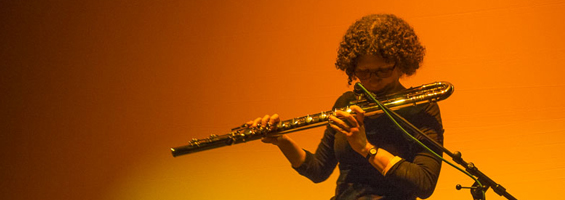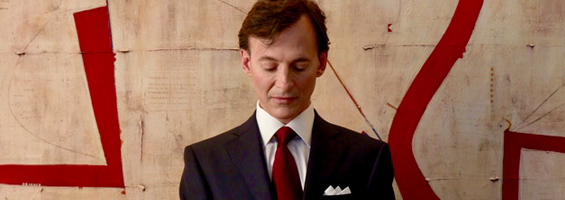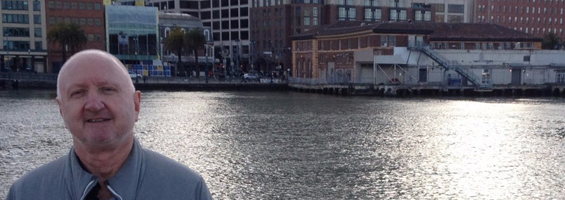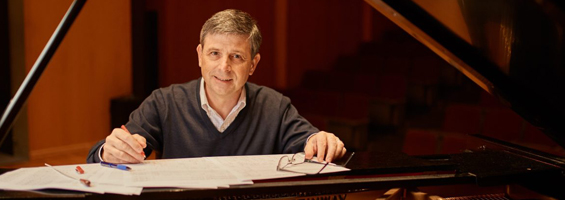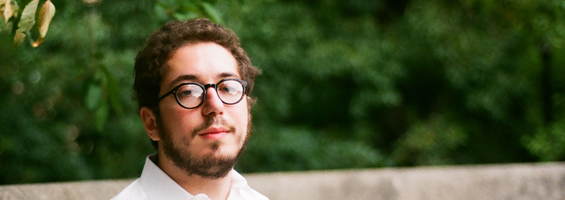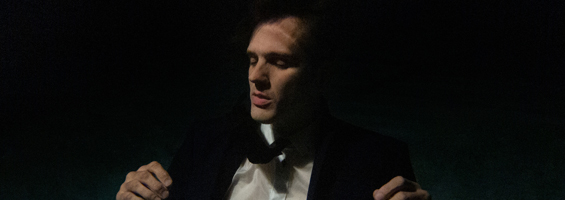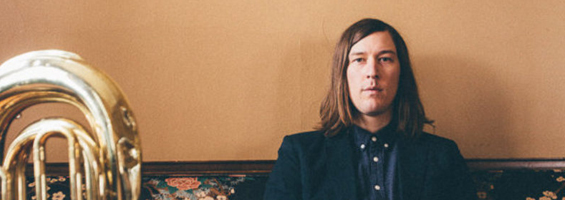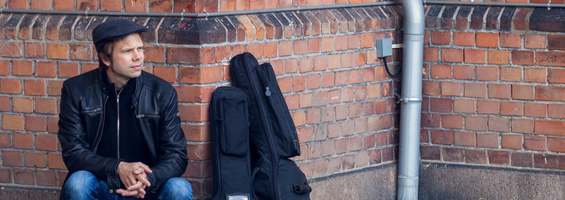
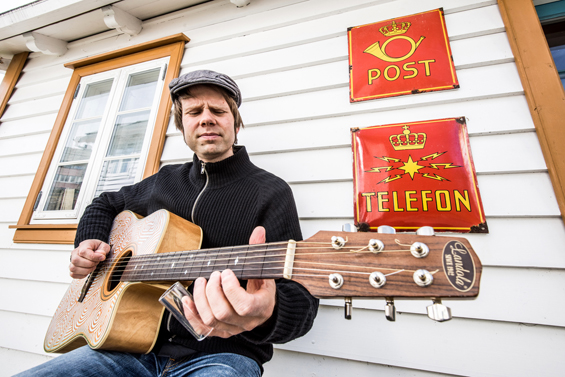
2019 ARTIST PICKS
For this year's article, artists whose works appeared in the “2019 Top 10s & 20s” lists were asked to share their own favourites. textura is extremely grateful to those who contributed to the article (especially when the call for contributions comes at such a busy time of year), and thank them not only for their generosity but also for the many hours of pleasure their music brought us during 2019.
Ashan • John Atkinson and Talya Cooper • Kinan Azmeh • Christopher Cerrone • Chronotope Project • Buck Curran • Donnacha Dennehy • Douwe Eisenga • Fallows • Steve Haines • Toby Hay • David Helpling • Matt Herskowitz • Hevreh Ensemble • Isnaj Dui • Bruce Levingston • Alex Lore • Josh Mason • Chelsea McBride • Mark John McEncroe • James Murray • Zachary Paul • Jessica Pavone • Scott Reich • David Ian Roberts • Matt Sargent • Joseph T. Spaniola • Leo Svirsky • Christopher Tignor • Matt Ulery • Stein Urheim
Ashan (#8 Singles / EPs / Cassettes: Transfigurations, Inner Islands)
(Sean Conrad) One of my favourite albums from 2019 is Malibu's One Life. Julianna Barwick is one of my all-time fave contemporary artists, and she curated this collection for Joyful Noise's guest-curated White Label Series. Gem spotted by a gem—go figure. The way Malibu weaves her voice in and out of lush synths and field recordings is incredibly beautiful. Minimal elements somehow achieve a full and maximal effect. And it's completely on point for my taste in texture. It's really quite transcendent. Much thanks to my friend Michael, who keeps me in touch with contemporary music.
John Atkinson and Talya Cooper (#9 Ambient / New Age: Plains, Florabelle)
(Talya Cooper) Itasca: Spring (Paradise of Bachelors): Kayla Cohen writes thoughtful, carefully crafted folk songs, tinged with an early-'70s comedown wistfulness befitting our troubled times and the fragility of the ancient landscape she chooses as her subject matter.
Magnetizer: Simulacra Stupid (self-released, magnetizer.bandcamp.com): My friend Wormhole listens to a lot of Emerald Web and E-40 and Aphex Twin and makes really good-weird, dark, cosmic techno in his garage. He rates Simulacra Stupid as “my best album, I think,” and I can't disagree.
Amazing Grace (directed by Sydney Pollack) and Homecoming (directed by Beyoncé Knowles-Carter): The two musical experiences of this year that left me the most in awe, feeling at once emotionally raw and energized from all the feelings that passed through me over their runtimes, were these two concert documentaries.
(John Atkinson) I spent an insane amount of time this fall driving around the Midwest and listening obsessively to Kath Bloom and Loren Connors' Moonlight album from 1984, reissued by Chapter Music this year and discovered by me via my friend Blythe Sheldon's great World of Echo radio show on BFF.fm. Just a world of tender, plainspoken truth, vulnerable beauty, and melancholic grace, almost uncomfortably intimate, and above all extremely human—all so rare and precious in the whirl of 2019.
Kinan Azmeh (#2 Classical: Uneven Sky, DreyerGaido)
I've been recently checking out and loving the work of Swiss pianist and composer Nik Bartsch; the album Awase with the band Ronin for me has been a recent source of inspiration. Also one of my favourite new albums is Hidwa by my dear friend and long-time collaborator, Syrian vocalist Dima Orsho.
Christopher Cerrone (#7 Classical: The Pieces That Fall to Earth, New Amsterdam Records)
Two of my favourite albums of this past year each reckon, complicatedly, with Americanness. Matt Sargent's Separation Songs features a double string quartet playing arrangements of Williams Billings tunes that morph and bleed into one another. Originally, the score was generated live and the players would go from tune to tune on a moment's notice. But when he recorded the work, it settled into its current, fixed arrangement. It's a gorgeous thing. The experience of listening reminds me of a line from the poet Frank Stafford: It's like “A song that comes apart / Like a rosary / In the back of a church.”
Scott Wollschleger's American Dream is a dark reckoning with the current moment, not with outrage but with a kind of anguished melancholy. It reminds me of the time that I drove through the badlands in South Dakota: a rugged and barren, yet exquisitely gorgeous landscape. There are moments when hope does peek through, and they're my favorite part of the piece. James Joyce: “History [...] is a nightmare from which I am trying to awake.”
Chronotope Project (#4 Ambient / New Age: Lotus Rising, Spotted Peccary)
Steve Reich's vital rhythmic minimalism is given a crisp and organic treatment in the Colin Currie Group's dynamic 2019 release Live at Foundation Louis Vuitton. Currie is one of the best classical percussionists in the world and has assembled a top-notch ensemble that specializes in the music of Steve Reich. Particularly striking on this recording is Mallet Music (quartet for marimbas and vibraphones) and Reich's 2017 composition for mixed ensemble Pulse. As a composer, I'm inspired by Reich's endlessly evolving polyrhythmic inventions. His classic Clapping Music (performed by Currie and Reich himself) is a marvelous demonstration of the rhythmic possibilities of just two pairs of hands, using West African rhythms to spin out compelling and inventive variations. The album has plenty of variety and is beautifully recorded and mixed.
Buck Curran (curator) (#2 Compilation: Ten Years Gone: A Tribute to Jack Rose, Tompkins Square)
ML WAH's Deep Roots: Matt LaJoie (from Maine), working under various monikers (Herbcraft, Cursillistas, etc) since the mid-2000s, is a musical visionary, and one of the most prolific artists making music in the psychedelic genre. His latest album Deep Roots is a joyful, blissful continuation of his musical journey—a singular, psychedelic reverie.
Eric Dolphy's Musical Prophet: The Expanded 1963 New York Studio Session: One of the significant developments of my own music (evolving through folk and blues, and getting me to think outside the box) came directly from the inspiration I got when first discovering Eric Dolphy's music in the early '90s. This album contains the previously released “Alone Together” (bass clarinet and upright bass), which is one of my all-time favourite recordings of improvisation. His flute playing is something I love deeply! For me, Dolphy's music creates so many images, so much life: mysterious forests of Southeast Asia, sitting on a cliff somewhere in Northern California watching the swelling vastness of the Pacific Ocean below, birds singing in the morning, European sojourns, the bustling streets of NYC. The flute composition included on this album, “Ode to Charlie Parker,” is sublime.
Donnacha Dennehy (#8 Classical: The Hunger, Nonesuch)
György Kurtág's Scenes (Audite): Kurtág is a composer that I've sort of ignored really, to be honest. I knew his remarkable orchestra piece Stele and a few other things, but he was not someone that I listened to that much. It really struck me that I was missing out when I heard and saw his stunningly focused operatic adaptation of Beckett's Endgame this spring in Amsterdam. I went on a little Kurtág listening spree afterwards and became taken with this 2019 disc of his vocal music. The “Scenes” and “Scrapbooks” especially are like fierce little musical aphorisms, and I love soprano Viktoriia Vitrenko's pure, almost unadorned delivery.
Douwe Eisenga (#19 Classical: For Mattia, TRPTK)
Although not from 2019, “Dionysus” by Jocelyn Pook was by far my favourite piece of the year. From the album Untold Things and used in the film Gangs of New York, her piece has been described as haunting and otherworldly. It is.
Another discovery was the stunning 2016 album Songs of Exile Volume II, written by John Hodian and played by the Nahgash Ensemble. From the group's site: “A feast of rhythm, energy and color, Songs of Exile Volume II combines the heart and soul of traditional Armenian music with new classical music and the unbridled energy of jazz and rock. Oud & dhol are the driving force of the ensemble along with zourna, dumbek, and the bewitching voices of three of Armenia's finest vocal soloists for music that is both traditional and contemporary.” A must-hear.
My only album selection from 2019 contains the music Woodkid wrote for a new Louis Vutton collection. What? Music for ladies' bags? Yes, music for ladies' bags. Nevertheless, Woodkid For Nicolas Ghesquière - Louis Vuitton Works One is an amazing album, with the ten-minute “On Then and Now” a highlight.Fallows (#2 Singles / EPs / Cassettes: Soundness, oscarson)
(Anne Garner) Nick Cave and the Bad Seeds' Ghosteen really captured my imagination and took me to difficult places I didn't want to leave. It's satisfyingly experimental throughout but always sensitively executed. There are painful truths in there that spoke to me even though I was initially unaware of the album's tragic inspiration. Now that I know, I find the whole thing devastating. What a beautiful, brave work of art.
(Jeff Stonehouse) Being a fan of all things Lynchian, I was thrilled to see Dean Hurley release another album this year. Anthology Resource Vol II - Philosophy of Beyond is a journey into the twilight zone, like listening to the songs of the stars.
Dean is a fellow traveller in the world of sound manipulation, taking a limited palette of sounds, and metamorphosing them into atmospheres both quiet and sinister, and this compilation of recent compositions really makes me want all my garmonbozia.
Steve Haines (#8 Jazz: Steve Haines and the Third Floor Orchestra, Justin Time Records)
Rhiannon Giddens with Fransesco Turrisi: There is No Other. Rhiannon's work ethic continues to inspire me. While the music itself is sublime, this album goes beyond music and forays into cultural observation, sort of like Max Roach's Freedom Now.
Toby Hay (#6 General: New Music for the 12 String Guitar, The state51 Conspiracy)
The record I'm choosing as my favourite of 2019 is Little Common Twist by Charles Rumback and Ryley Walker. I picked up a copy from Spillers Records (the oldest record shop in the world) in Cardiff when I played an in-store show there towards the end of November. I love records that capture the energy and spontaneity of performance, and this record does that beautifully.David Helpling (#7 Ambient / New Age: RUNE, Spotted Peccary)
2019 was a transformational year both personally and in the realm of new music. Releasing RUNE was a shimmering event that is still echoing all around me. I've said this a few times recently, but I do very little recreational listening as I spend much of my time in the studio working on one project or another. There is just so much going on right now in that regard.
That said, there are a few pieces of music that are so rich and so emotionally and texturally stunning that I need them almost like a drug at times. One of those lately has certainly been “Surrender (Float)” by Matthew Schoening from his release Narrow Path. This track gets me every time and speaks something really special; it feels personal to me at this point. He channels his music and improvises in a very textural way that both resonates with my being yet feels like home.
Another would be “Fantasy - Sicut Cervus” by the stunning Miriam Stockley from Eternal. This short piece of music feels like a plea of passion and a desperate war cry, somehow all at once. It is nebulous, swirling, and circular in a way that is truly ambient, but I'm sure there is more structure to it than is apparent. If I put this piece on I end up repeating it for a long time … tears, chills, repeat.
Matt Herskowitz (#11 Jazz: Mirror Image, Justin Time Records)
My favourite album of this year is Christian Sands' Chasing Dragons. I like his ‘cool' approach, the way he uses space in his playing; his tunes are really nice with a great vibe, and the guy has a gentle groove that lulls you in. I find his playing and his approach quite mature for a young dude! My other favourite discovery of the year was Eldar's Three Stories. What a killer pianist: great rhythm and killer grooves! But of course I'm going to like a guy who mixes classical and jazz in his own way. I wish I could say that Three Stories inspired me for Mirror Image, but I discovered it later, being earlier this year. I was like "Wow, someone else is doing it too, cool!"
Hevreh Ensemble (#4 General: A Path of Light, Ansonica Records)
This past year as we eagerly awaited the release of our new CD, A Path of Light by PARMA Recordings on the Ansonica Label, members of Hevreh Ensemble were impressed by several new recordings.
(oboist Judith Dansker) I was touched by the lovely and haunting recording by The Crossing called Evolutionary Spirits (Navona). I often listen to early and contemporary music as I carve oboe reeds. Music keeps me focused and relaxed as I deal with recalcitrant cane! As I listened to tracks from Evolutionary Spirits, I looked out the at the woods on a sunny and cold winter day and felt that the tightly knit but ethereal harmonies served as a balm for the soul in these troubling times. One of the tracks that's particularly captivating is “Y'did nefesh,” which is based on an ancient Hebrew Prayer.”
(bass clarinetist, composer, and native flute player Jeff Adler) One of my favourite albums in 2019 is Of Death and the Planets by the composer Jim Lahti and the ensemble Di.vi.sion (Albany Records). This is a song cycle for soprano, tenor, and chamber ensemble based on the poetry of John McVeety. He wrote a poem for each planet as if traveling through space. Lahti himself says, “The imagery, the wonderful use of language, and the power of these poems compelled me to compose this work. The sheer scope of the poems suggested larger forces than just a piano and voice and also suggested more than one voice. The result is this song cycle. Only in the epilogue do the two singers perform in duet.” The music is serious but accessible and of the highest quality and the performance is first-rate.
Isnaj Dui (#9 General: Sight Seeing, Fbox Records)
I've been really enjoying Loosening the Strings, the debut solo release from Haymanot Tesfa. It's a lovely collection of songs, and as I write this it's blowing a gale outside but her voice is keeping me warm and cosy…
Bruce Levingston (#14 Classical: Citizen, Sono Luminus)
I really enjoyed Lisa Bielawa's Vireo. Bielawa is one of today's true visionary composers, fearless, innovative, and deep. I also loved Chris Tignor's A Light Below. Tignor possesses a uniquely genuine and original voice and is not afraid to let us hear and feel true intimacy. Very rare.
Alex Lore (#19 Jazz: Karol, Lore)
Matt Mitchell's Phalanx Ambassadors (Pi Recordings): I love this album because there are so many different ways to listen to it. With each pass, my focus shifts to a different member of the ensemble or to a different moment of the piece and I hear something I didn't hear before. This is a quality I've always treasured in listening to music. Matt's music is simultaneously complex and grounded, grooving in a visceral way that makes the journey of listening a fulfilling and truly enjoyable experience.
Kate Davis's Trophy (Solitaire Recordings): I briefly attended the Manhattan School of Music with Kate in 2009, and I always admired her musicianship and ability. Her lyrics are raw and piercing, and her musical forms are nuanced and subtly intricate. The rhythmic and harmonic complexity of Kate's music is difficult to find in the more mainstream indie-rock world. Kate is one of those special musicians whose judgement you can always trust, no matter what area of the musical spectrum they decide to occupy.
Josh Mason (#8 Ambient / New Age: Coquina Dose, Florabelle)
For me, it's duality over dichotomy, and people are often surprised to find, given the music I make, that I enjoy quite of bit of death metal and the like, and that it plays a role in the work I make, however subtly. While I enjoy it on a visceral level and have since I was in high school, I think that it seeps into my subconscious as something to be decoded: the angularity, the timing, the calculation. And like a game or a puzzle, I'm very interested in how it all works and comes together in a way that delivers when you don't expect it to. Some standout records in that vein this year include Blood Incantation's Hidden History of the Human Race, Nile's Vile Nilotic Rites, and the self-titled release from No One Knows What The Dead Think. Things are not all doom-and-gloom however, and neither are they (or should be) new. Due to a vinyl reissue, I was hipped to the skittering nautical electronics on Roméo Poirier's Plage Arrière (which I'm still not convinced isn't a secret incognito Jelinek/Faitiche-related project, but perhaps that's best left for another ramble), which is great, and I also managed this year to track down a copy of Sam Zurick's Flower Power? 1992-2002, which is a collection of solo guitar noodles from the Make Believe guitarist that I've been trying to find for forever.
Chelsea McBride (#10 Jazz: Aftermath, Chelsea McBride)
I make a point of listening to a lot of stuff, especially in these last few weeks where I've been finding inspiration a little harder to latch onto, but it means that I don't get as deep into some of these albums as I'd like to. This year, especially since I've been making an album, I don't get to take in as much material as I'd like.
But there are a couple albums I've been revisiting regularly: Cuz I Love You by Lizzo and Ambar by Camila Meza. I was lucky enough to see Camila Meza live at Newport performing material off Ambar this year (such an incredible show!), but the record itself features some sublime string arranging and spectacular performances from Camila's quartet. I heard her live performance before I checked out the record, and I'm struck by how well it works in both situations, though I have to say, this album definitely deserves a dedicated listen all the way through. It's beautiful.
I was super late getting into Lizzo. I heard "Boys" at a friend's wedding this summer and didn't realize it was Lizzo until later in the night. But it was so catchy and fun that I knew I had to listen to this whole album, and when I dug into Cuz I Love You ... well, it's been one of my go-to let-loose albums for when no one else is home, although you will also catch me singing along to it in public whenever it's on. I think (as artists and audience members) there can be this idea that you have to listen to a certain kind of music if you play a certain kind of music. But you don't have to. After all, you're a better composer if you steal from everybody!
Mark John McEncroe (#1 Classical: Musical Images for Chamber Orchestra, Navona Records)
The idea to do chamber orchestra versions of my piano pieces (in two volumes) came from Anthony Armore, who has conducted and organized all of my recordings with the Janácek Philharmonic Orchestra over the years. It was the orchestra's managing director Jan Zemla, on the other hand, whose idea it was for the orchestra to record the live performance of my Symphonic Suite No.1—A Modern Medieval Tale. My last recording session with the JPO took place in January 2018 when the two orchestrated piano volumes and the pieces for the My Symphonic Poems release were completed. They did an excellent job, as did my longtime buddy Mark Saliba, who orchestrated these works (he and I are both Sydney-siders, though he now lives in Zagreb, Croatia). The orchestration work he did on these pieces speaks for itself.
The second volume of the orchestrated piano pieces will be released on the Navona label this February, which will complete all the material I've recorded with the JPO and with Armore conducting—a rich period in my life, filled with many great memories and many trips to Ostrava, Vienna, and Zagreb. Strong bonds have been formed with many of the staff and members of the JPO plus Jaroslav Zouhar, who was the engineer/producer for these projects, and Leos Zavadilik, who did the YouTube videos on my channel of my journeys to Ostrava. All of these people have become close friends, which has been the most rewarding thing in my musical journey and makes the whole thing meaningful, instead of lying on my Sydney couch listening to my old demo files and thinking, “You know, one day I should record some of this stuff and get it out there….Well, I've done that!” That's the journey, that's what it's all about, and the good news is there is much more stuff in the pipeline and many more journeys to come.
James Murray (#10 Ambient / New Age: Embrace Storms, Slowcraft Records)
It's been yet another strong year for collaborations. Two of my favourite people in the world, Ian Hawgood and Stijn Hüwels, made an album together called No Voices, and it's everything you could hope for. Special mention also to Benoît Pioulard & Sean Curtis Patrick's Avocationals on Beacon Sound, another fine collaborative release.
Zachary Paul (#13 General: Meditation on Discord, Touch)
Judged by play count, Lana Del Rey's Norman Fucking Rockwell was unironically my album of the year. Of greatest artistic impact, however, was John Luther Adams' Become Desert, the follow-up to his epic Become Ocean. Deeply moving, experimental without pretension, New Age-y without cheese, this piece scored many of this year's journeys both outward and inward, including a spiritual late-night drive into Joshua Tree that I won't soon forget. Organ Tapes' Hunger In Me Living gets an honourable mention for its wholly unique brand of extra-dimensional outsider pop.
Jessica Pavone (#16 General: Brick and Mortar, Birdwatcher Records)
Ellen O'sThe Air is Passing: When asked to write about a release from 2019, I was at a total loss. It dawned on me that I had not checked out any new music in 2019. Truth is, unless I had an obligation where I physically needed to be somewhere, I spent most of 2019 in a hole, in a haze, with my head under a pillow. Nope, sorry, I did not check out your new album, which brings me to why I am mentioning this one. At 11:11 pm on January 17th, 2019, The Air is Passing Bandcamp page was timed to be posted to the now-defunct Ellen O Facebook BandPage at the exact same time that I and four mutual friends received a timed email from the artist telling us she was dead with a brief explanation of why, who she was with, and instructions on how to get into her apartment and retrieve her cat. Ellen was working on her second album for Babygrande Records, and it appears that she released where she was at with it at the time of her death.
This event has greatly changed my life and my experience. As someone who has survived the suicides of two other close friends and multiple threats from a close family member throughout the course of my life, when she asked me my opinion of suicide on New Year's Day of this year, not having the faintest idea she was referring to herself, I had a somewhat clinical answer as that became my way of coping with my previous experiences. If I was more emphatic and emotionally against it, would that have changed anything? I'll never know.
Let's all listen to each other as well as each other's music.
(For more info, visit the 'American Foundation for Suicide Prevention' site.)
Scott Reich (#5 Ambient / New Age: Instar, Heart Dance)
David Helpling's “Glass,” from the album RUNE. David Helpling is an exquisite painter of visionary sonic landscapes, but it's not just the colours that give the music its expressive power, it is also the subtly shifting harmonic language and the otherworldly imagery evoked by the music. The expression is clean and has enough space around it to invite your heart to fill that space with its own offering. Simply put, he creates a space that one wants to inhabit. Perhaps it could be said that this is what all great art does.
They Dream by Day's “Fields of Moab,” from the EP of the same name. This can be called a form of minimalism, but it is one with great warmth. In fact, it seems to me that the space on this track is created in order that the warmth can enter, and be noticed more fully. I find that much of the music of They Dream By Day seems to reside in a place outside of time, which makes me almost think that this, in its way, is a musical illustration of the space-time continuum (i.e., if you warp space, then you warp time). Still, having said that, the piece does evolve within that space. It is this brilliant and unusual mix of expressive factors that led me to choose this track.
David Ian Roberts (#19 General: Traveling Bright, Cambrian Records)
My favourite album of the year is The Unseen In Between by Steve Gunn. It's got awesome riffs and a big string section, and the production is stunning. I love his fingerpicked playing, but I'm also really inspired by his approach to big electric solos. They're always so musical and don't really sound like anyone else.
Matt Sargent (#13 Classical: Separation Songs, Cold Blue)
An album that I've spent time a great deal of time with this year is Michael Pisaro's Barricades (elsewhere records, 2019). A set of variations on Couperin's Les Barricades Mystérieuses, the album is for solo piano, performed by Shira Legmann, with a sensuous electronic accompaniment that I haven't quite heard before in his music. The electronics, a series of sine tones and spectral images of the piano, radiate from the instrument as a ghostly presence, sometimes emerging to centre stage in the form of electronic interludes.
Joseph T. Spaniola (#20 Classical: Escapade, Big Round Records)
This year I have taken the time to investigate the music of Fred Sturm, most particularly his harmonic, melodic, and orchestrational approach. His recording ¡Libertango! featuring the Hessischer Rundfunk Big Band has been on my mind and in my ear. Sturm's approach achieves exciting harmonic colors and textures that have applications well beyond jazz. Fred's writing is dynamic and engaging, and the HR Big Band brilliantly brings his work to life.Leo Svirsky (#7 General: River Without Banks, Unseen Worlds)
Alvin Curran's Deadbeats, performed by Reinier Van Houdt (Moving Furniture Records): Writing about Inner Cities 9, Alvin Curran says, “Reinier, for whom this piece is written, will certainly make each note sound like the history of time…” It's not really a political piece, or even a memorial, but something like Thomas Pynchon's Deep Archer, a space for ghosts and shadows to gather in the wake of ‘deep' events. This release also has a new work, Dead Beats (in five parts), composed in the years following Inner Cities 9. There is an elegiac and autumnal quality to Dead Beats that also reminds me of Reinier's recent release with Current 93, The Light is Leaving Us All. In particular, the third movement features one of the most beautiful harmonic progressions in the piano literature. I got a copy from Reinier after a wonderful recital he gave of music by Giuseppe Chiari at Amsterdam's Orgelpark.
Giya Kancheli's Letters to Friends, performed by Andrea Cortesi and Georgian Strings (Brilliant Classics): Kancheli (who passed away October 2nd) was just as well-known for his large-scale symphonic works (of truly cinematic scope) as well as for writing some of the most treasured film music of the Soviet era, including classic films such as Mimino and Kin-dza-dza. Even in his larger works, the connections to film and theater are apparent. In these pieces he revisits some of his most beloved themes in a setting for violin and string orchestra dedicated to many of his old friends in Georgian cinema and played by musicians that he has worked with for many years.
La Nòvia's In C, performed by La Novia (Bandcamp): The French collective La Nòvia encompasses many artists working with all the various permutations of psychedelic drone approaches to traditional French regional music (Jéricho) or psychedelic drone music played on French folk instruments (France). Members of this collective do their own original ethnographic research and work on their own instruments. They uncover a European music that really feels like a part of ‘world' music after all! I think this could be the single best version of In C there is, two versions one electric and the other acoustic.
Patty Waters' Live (Blank Forms): Waters and pianist Burton Greene can be heard together on the legendary ESP disk release ... Sings from 1966, a release whose influence is simply incalculable. This is a set from 2017 following the death of Cecil Taylor; there is an elegiac quality to this performance as well, one that always comes from revisiting music from so far in the past. I was lucky to see the same group play at the Le Guess Who festival in Utrecht right after the 2016 election. “Strange Fruit” felt especially strange then. Later that afternoon, I saw what turned out to be the final performance of Pauline Oliveros. I got a copy of this LP from Burton himself at a concert he did with my friends Balasz Pandi (who put six great records out this year alone!) and Gert-Jan Prins at Rotterdam's Koffie en Ambacht.
Valentin Silvestrov's 2 xopa (Bandcamp): Like Kancheli, Valentin Silvestrov is known for large-scale symphonic works of truly cinematic scope and feel. However, these large symphonies were always fragile tapestries of shifting musical moments and resonances, shifting between rumbling thunder and moments of shimmering light. In later years, he has mainly taken to writing collections of short pieces, bagatelles. Stringing these pieces together makes a kind of symphony of moments, no less significant than the works for large forces. Recently he has been self-releasing a number of these as CD-rs on bandcamp; it's hard to pick one, but there's something that feels special about this one. It begins with two songs sung by the composer himself, and than continues with instrumental pieces dedicated to Kancheli and also to the great St. Petersburg composer Alexander Knaifel (whose ECM release Lukomoriye was for me the most significant release of last year). Many of these pieces date from 2005/2006, the period when he was writing the music that appears on the ECM release Bagatelles and Serenades. These recordings capture something that the more polished productions do not; these pieces are private, meant to be heard in the background of the domestic interior, a ticking clock, birds chirping, dogs barking and children playing...
Favourite Songs: Jessica Pratt's “This Time Around”; Weyes Blood's “Andromeda”; Sybyr's “Talisman” (prod. Landfill); Earl Sweatshirt's “East.”
Christopher Tignor (#1 General: A Light Below, Western Vinyl)
There were many great albums this year, but one stuck out to me, which is another way of saying it tickled a lot of the compositional and performance bones that constitute my own work: Daniel Thorne's Lines of Sight (Erased Tapes). What Thorne does with saxophone and synth layering here is truly remarkable and very unique, but what really carries these compositions is a really captivating sense of harmony, motif, and texture. This is music with a taut musical narrative, that is to say really effective forms, something that so much music drops the ball on, happy to introduce an idea, let it drift, and die. Thorne's compositions go someplace, and those places feel fresh and new, and make you want to take the journey. The music is also so viscerally played, not sequenced—nothing can replace the emotion you get from someone breathing their life with actual breath into the world. Really enjoyable.
Matt Ulery (#2 Wonderment [with Zach Brock and Jon Dietmeyer], Woolgathering Records; #4 Jazz: Delicate Charms, Woolgathering Records)
El Regreso by Juan Pastor's Chinchano is one of my favourite albums from 2019. Chinchano have a truly unique style of Peruvian folk musics-informed jazz. The rhythm is deep.
Weaver by Twin Talk is another of my 2019 favourites. Their live trio playing is always stunning and inspiring. I love hearing their creativity in the studio on this one.
These happen to be two of my favourite bands in Chicago.
Stein Urheim (#3 General: Simple Pieces & Paper Cut-Outs, Hubro)
Morgonrode's Morgonrode: eponymous debut album from experimental, Norwegian folk-music group of young, both traditional and jazz/improv musicians combined, performing old tunes in a completely new wrapping in a way I always wanted to hear this type of music.
Gaby Moreno & Van Dyke Parks's Spangled!: Moreno's beautiful and powerful voice combined with Parks's amazing arrangements (he's on fire here!); a modern classic, and for all the drum-fans out there: Jim Keltner (77), who's also on fire.
My all-time favourites this year: A World Out of Time Vols. 1 & 2; Henry Kaiser & David Lindley in Madagascar: Such an elegant and playful way to present this gorgeous tradition from the unique island.
And two classics I always come back to: Terje Rypdal / Miroslav Vitous /Jack DeJohnette, the masterful trio debut on ECM from 1978; one of my favourite trio jazz albums, up there with Money Jungle. And Jim O'Rourke's Insignificance: I always liked this, ever since it came out almost twenty years ago, but it keeps growing and growing, and I´m discovering a new layer every time I hear it.December 2019![]()
